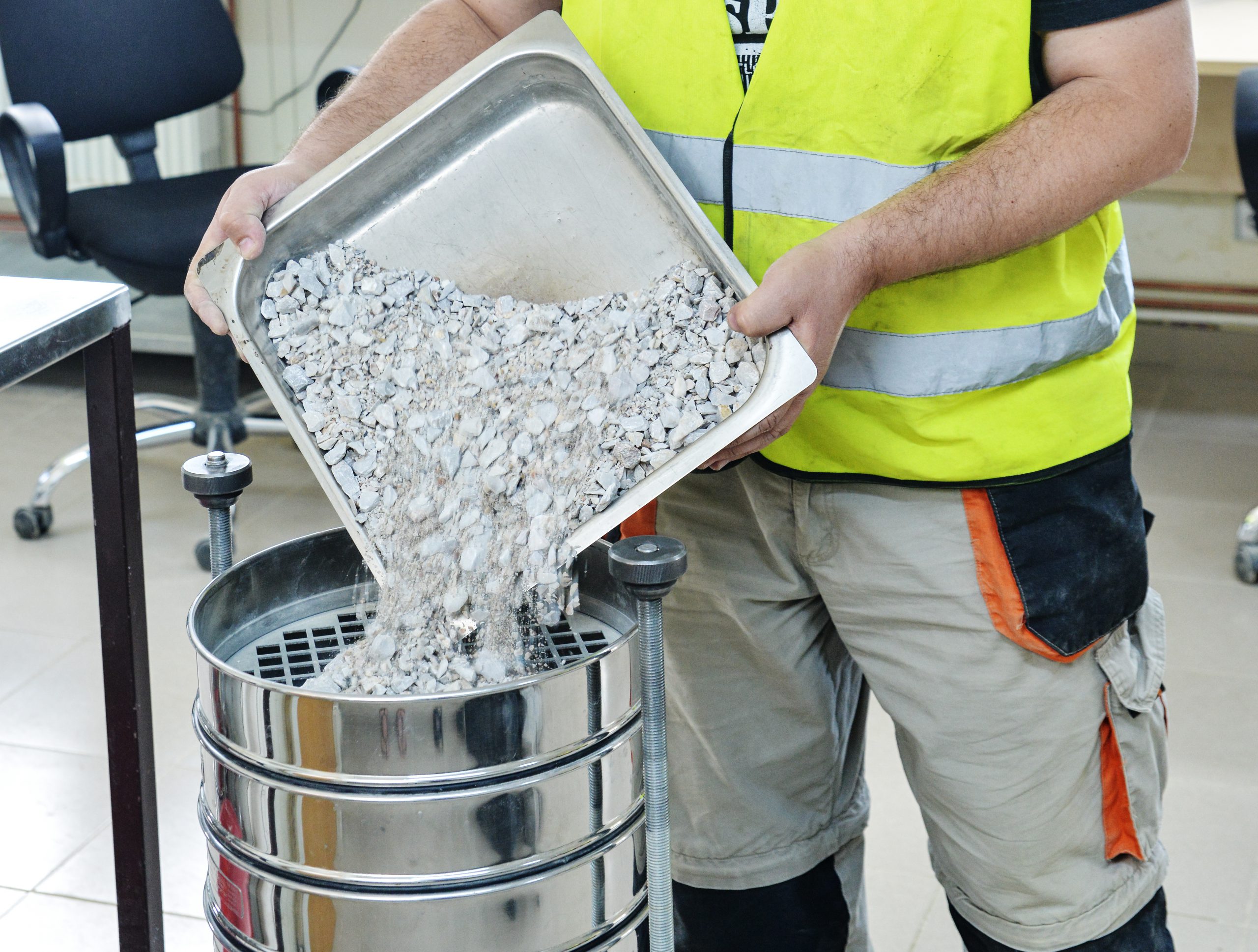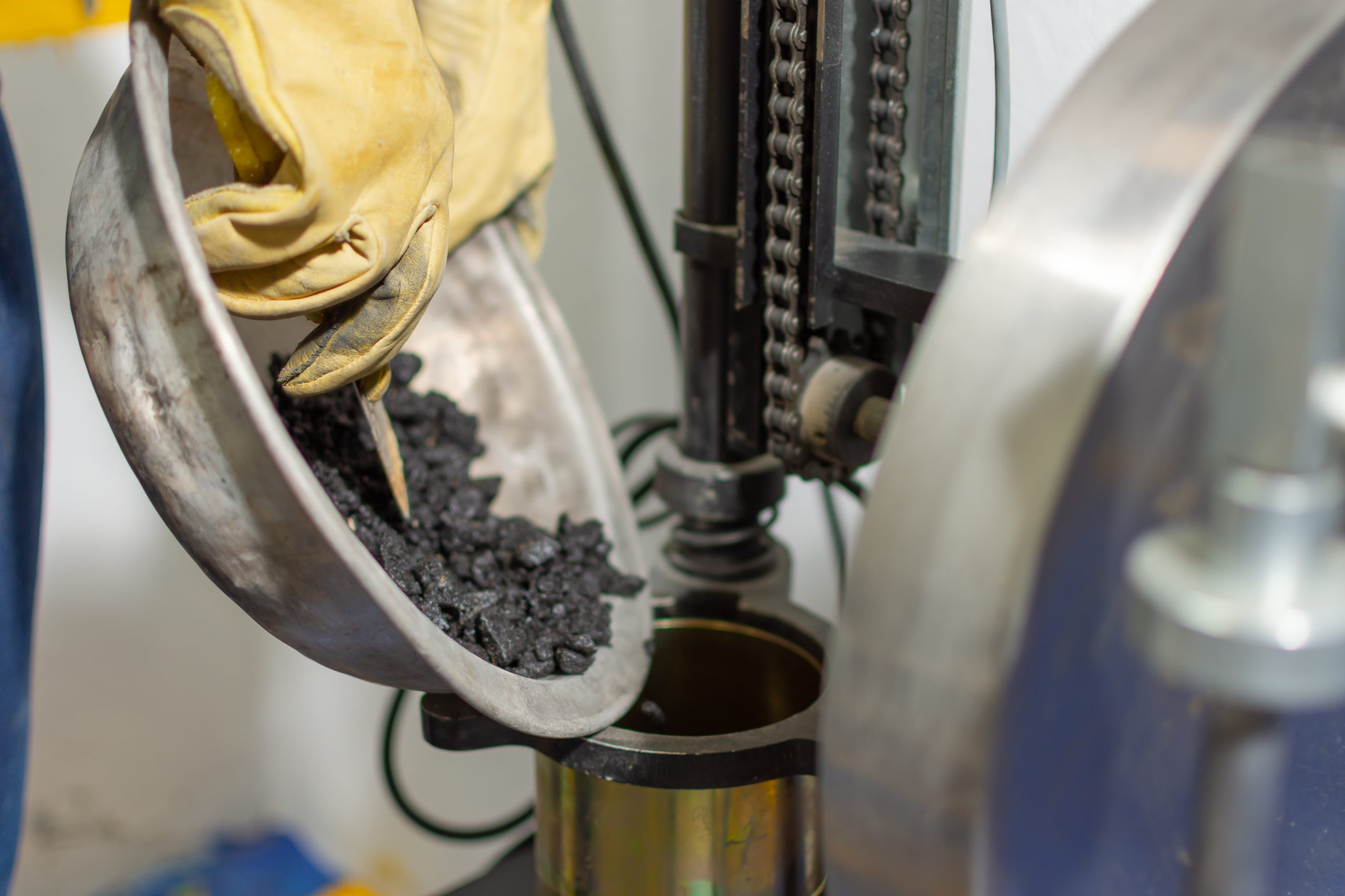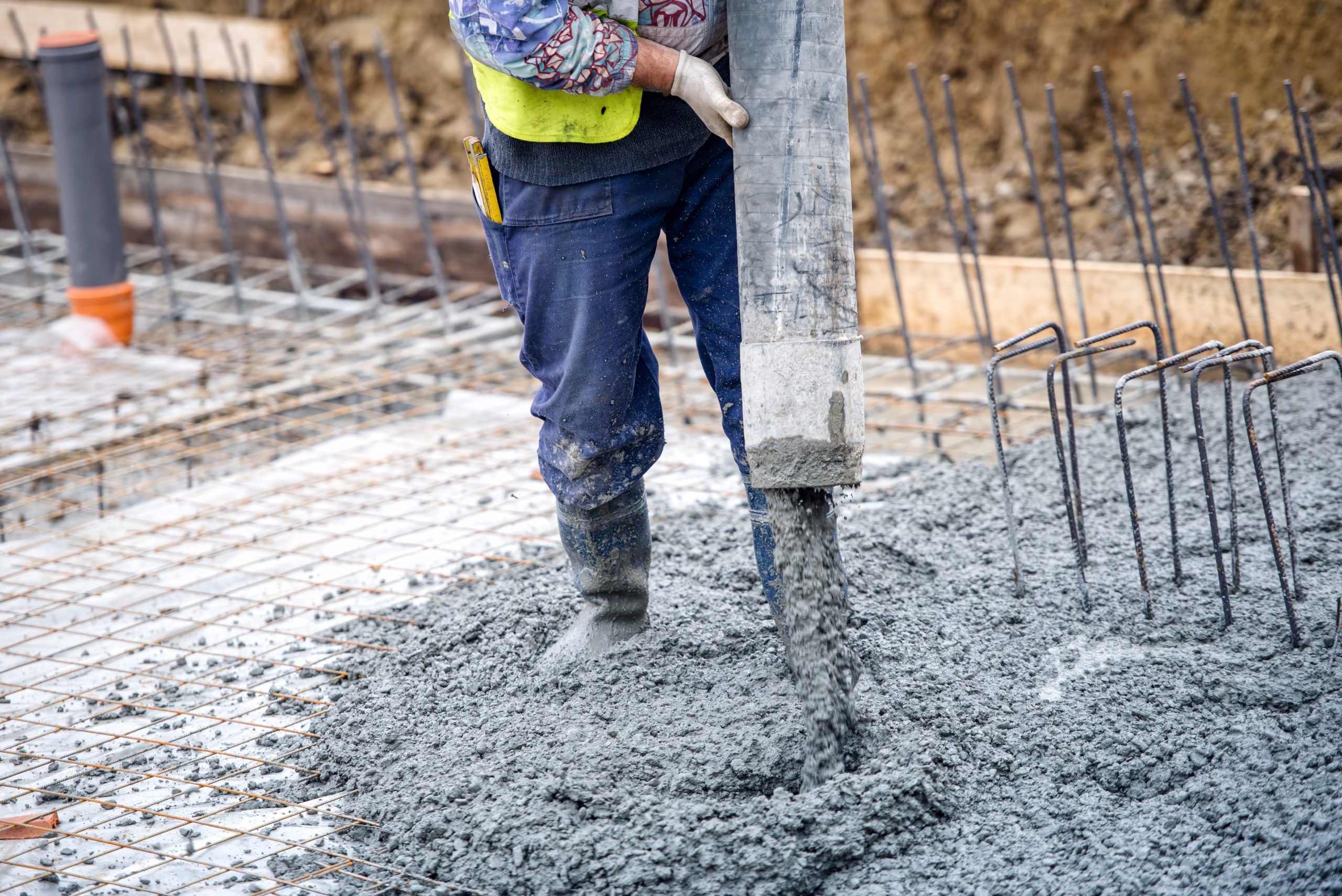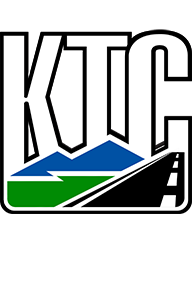Search for articles or browse our knowledge portal by topic.
Division of Materials

The Division of Materials has two branches — the Structural Branch and Asphalt Materials Branch. The division’s key responsibilities include:
- Providing technical and contract support and assisting Section Engineer Offices and District Material Laboratories as well as the other divisions within KYTC.
- Developing materials specifications, testing procedures, manuals, and making recommendations on how materials are placed.
- Providing training.
- Maintaining for division and district materials labs accreditation through AASHTO’s lab accreditation program (AAP).
- District Materials Supervisors (DMS) are responsible for the inspection and accreditation of all other labs within the district that perform acceptance testing, including contractor and consultant labs.
- Maintaining and updating information in SiteManger related to materials testing and contract requirements.
- New products that have been used selectively on a project are entered into the Kentucky Product Evaluation List (KyPEL). The Division of Materials enters into KyPEL testing information and data on performance throughout product service lives. This information is used to make decisions about using products statewide.
- Certifying when a contract is complete and that all material sampling and testing requirements have been meet.
The Asphalt Materials Branch consists of three sections — (1) Field, (2) Liquid Asphalt, and (3) Asphalt Mixture — that perform physical testing, obtain samples, provide technical assistances, and offer training when needed. It maintains and develops specifications, testing procedures, and protocols for materials that fall under its purview. The branch maintains SiteManager and LIMS testing requirements for these materials and makes recommendations about the placement of materials.
1.1 Field Section
The Field Section Office is staffed by asphalt materials liaisons who perform testing and inspections, create materials specifications, conduct training, and execute other tasks. Liaisons work closely with DMSs to inspect and approve asphalt mixtures and asphalt plant qualifications. This section performs the following tasks:
- Before production, inspects, makes recommendations on, and approves new asphalt plants that will produce materials for KYTC.
- Inspects and approves asphalt plants yearly prior to production.
- Updates the List of Approved Materials (LAM) approved asphalt plants use.
- Maintains and corrects the Asphalt Mixture Acceptance Workbook (AMAW).
- Makes recommendations on and executes changes in SiteManager to meet current specifications and testing requirements.
- Works closely with DMSs to ensure that mixture production, daily plant inspection, sampling, and process control/acceptance/verification testing conform to applicable specifications. Help evaluate asphalt mixtures and make recommendations (if needed).
- Develops, reviews, and recommends changes to policies and procedures, manuals, methods, and specifications related to asphalt mixing plant operations, the production of asphalt mixtures, and process control/acceptance/verification testing.
- Provides recommendations on and data related to asphalt plants, asphalt production, and/or specifications when by other state offices submit requests.
- Facilitates training for the Superpave Plant Technologist and Superpave Mix Design Technologist qualification programs.
- Researches and evaluates ways in which new products can be used and how the performance of asphalt mixtures can be improved.
1.2 Liquid Asphalt Section
The Liquid Asphalt Section is responsible for testing, acceptance, specifications, training, testing procedures and protocols, SiteManager, and inspecting several different materials. This section performs the following tasks:
- Approves and inspects liquid asphalt source terminals, refineries, and labs.
- Verifies quality control procedures for materials certification.
- Helps develop and approve quality control procedures as well as testing procedures required at the producer’s location.
- Inspects, tests, and verifies that quality control procedures and testing are being performed.
- Performs yearly testing to ensure materials meet specifications and that quality control procedures are followed by liquid asphalt suppliers and producers.
- Performs acceptance and informational testing and verifies certifications of materials.
- Develops specifications, recommendations, policies, and testing procedures.
- Offers training and tests materials when requested by other divisions.
- Maintains and corrects specifications, manuals, testing methods and protocols, policy, procedures, SiteManager and LIMS to help maintain or improve materials.
- Researches and evaluates how new products can be used and the ways in which the performance of liquid asphalt mixtures and other materials can be improved.
- Maintains AASTHO accreditation and submits recommendations and/or comments to AASHTO and ASTM.

1.3 Asphalt Mixture Section
The Asphalt Mixture Section is responsible for testing, acceptance, and approving bituminous mix designs. It handles training, specifications, testing procedures and protocols, manuals, SiteManager, and inspections and testing of existing pavements. The section also performs the following tasks:
- Verifies, tests, and evaluates mix designs submitted by producers for KYTC approval.
- Tests and evaluates the production, placement, and performance of experimental bituminous mixtures.
- Makes recommendations and/or comments related to future changes in bituminous mixtures and testing.
- Performs research to develop new specifications, test methods, equipment, and to validate changes.
- Researches new products by placing them on the roadway and evaluating their performance. Determines if performance improves existing conditions.
- Tests existing bituminous pavements to identify actions that can be taken to improve their performance.
- Maintains the lab and equipment to ensure the Division of Materials keeps its AASHTO lab accreditation.
- Maintains and corrects specifications, manuals, testing methods and protocols, policies, and procedures to help maintain or improve the bituminous pavement performance.
- Creates and corrects the MixPack spreadsheet that producers use when submitting a bituminous mix design.
- When a mix design is submitted to the section it is evaluated to determine if it meets specifications and is acceptable for use.
- Inspects equipment and records in district materials labs for AASHTO lab accreditation.
- Creates and maintains a certification training program focused on mix design and acceptance testing. The two training programs are Superpave Plant Technologist and Superpave Mix Design Technologist. When requested the section offers training to other agencies, industry, or any business.
- Administers the annual cooperative testing program, which offers labs the opportunity to compare their equipment and testing procedures with other labs.
- Maintains and corrects specifications, manuals, testing methods and protocols, policy, procedures, SiteManager and LIMS to help maintain or improve materials.
- Provides assistance and guidance to District Materials Section Supervisors (DMSSs) and the industry upon request.
The Structural Materials Branch consists of three sections — (1) Aggregate, (2) Chemical, and (3) Concrete/Physical — that perform physical testing, obtain samples, and provide technical assistance and training when needed. Section offices maintain and develop specifications as well as testing procedures and protocols for materials that fall within their respective purviews. The Structural Materials Branch maintains SiteManager and LIMS testing requirements for all materials that fall within its purview. It also makes recommendations on the placement of materials.
2.1 Aggregate Section
The Aggregate Section includes the Field Office and Laboratory Office.
2.1.1 Aggregate Field Office
Field Offices are staffed by field liaisons who work in the field and labs and acquire test samples, develop specifications, offer training, and approve aggregate sources for use by KYTC. The office:
- Inspects approved rock quarries, documents ledges on which production is occurring, verifies quality control procedures, and inspects labs and their equipment to ensure AASHTO accreditation is maintained.
- Inspects new rock quarries, obtains produced aggregates and rock ledge samples, documents ledges on which production has or is occurring, checks labs for appropriate equipment, and classifies aggregates.
- Provides assistance and guidance to DMSSs and industry upon request.
- Evaluates and monitors the performance of polish-resistant pavements.
- Determines if a quarry meets the specification to become a polish-resistant aggregate source. Maintains and updates the polish-resistant aggregate list along other aggregate types in the LAM.
- Determines and approves aggregate sources for freeze-thaw specifications and maintains a list of approved quarries on the LAM’s Concrete Aggregate Restriction List.
- Corrects SiteManager and LIMS when specifications are changed or when required.
- Assists the Kentucky Crushed Stone Association (KCSA) with teaching and proctoring exams for the Kentucky Aggregate Technician Program.
- Administers the annual cooperative testing program, which offers labs the opportunity for labs to compare their equipment and testing procedures with other labs.
- Maintains and corrects specifications, manuals, testing methods and protocols, policy, procedures, SiteManger and LIMS to help maintain or improve materials.

2.1.2 Aggregate Laboratory Office
- Performs several types of acceptance and informational testing to determine if products meet specifications.
- Provides recommendations based on acceptance and informational testing for polish-resistant and freeze-thaw aggregates.
- Offers assistance and guidance to DMSSs and industry upon request.
- Helps administer the annual cooperative testing program, which offers labs the opportunity to compare their equipment and testing procedures with other labs.
- Maintains and corrects specification, manuals, testing methods and protocols, policy, procedures, Site Manager and LIMS to help maintain or improve materials.
- Maintains the lab and equipment to ensure that Division of Materials keeps its AASHTO lab accreditation.
2.2 Chemical Section
- Performs acceptance, informational testing, and verifies certifications for materials.
- Verifies and approves striping vehicles used to apply longitudinal lane markings to roadway surfaces on a yearly basis.
- Verifies and approves mobile retro-reflectivity vehicles in accordance with requirements set forth in districtwide striping contracts.
- Prepares and teaches courses each year for the Qualified Pavement Markings Technician training.
- Provides technical assistance to district personnel on issues related to the installation, inspection, and failure of pavement markings, bridge or structural steel painting, sign sheeting materials, and other materials.
- Performs chemical analysis of aggregates using the insoluble residue test to determine (1) if an aggregate meets the requirements for a polish-resistant aggregate and (2) if the correct percentage of polish-resistant aggregates was used to produce the asphalt mixture.
- Maintains and corrects specifications, manuals, testing methods and protocols, policy, procedures, Site Manager and LIMS to help maintain or improve materials.
- Maintains the lab and equipment to ensure that Division of Materials keeps its AASHTO lab accreditation.
- Maintains and corrects specifications, manuals, testing methods and protocols, policies, and procedures to help maintain or improve materials.
2.3 Concrete and Physical Properties Section
The Concrete Section consists of two offices — the (1) Concrete Field Office and (2) the Concrete Laboratory Office. Both offices make recommendations on and changes related to specifications, SiteManager, manuals, and testing procedures and protocols.
2.3.1 Concrete Field Office
This office is staffed by field liaisons who work in the field and laboratories to take samples, develop specifications, perform testing, and approve or obtain approval of plans for concrete beams and certain precast items. The office:
- Inspects, tests, and approves new ready-mix concrete producers and lists producers on the LAM and in SiteManager.
- Inspects, tests, and approves new concrete pipe, pre-cast, and pre-stress plants and lists concrete plants on the LAM and in SiteManager.
- Performs inspections, sampling, and testing annually and randomly throughout the year to verify ready-mix concrete, concrete pipe, concrete pre-cast, and concrete pre-stress meet specifications and evaluate quality assurance/quality control (QA/QC) plans.
- Provides technical assistance during construction and production to the Section Engineer Supervisor and DMSSs on issues related to concrete items.
- Approves or obtains approval for the design of concrete pipes, pre-cast, and pre-stress items.
- Corrects SiteManager and LIMS when specifications are changed or when required.
- Maintains the lab and equipment to ensure that Division of Materials keeps its AASHTO lab accreditation.
- Maintains and corrects specifications, manuals, testing methods and protocols, policies, and procedures to help maintain or improve materials.

2.3.2 Concrete Laboratory Office
The Concrete Laboratory Office conducts testing and provides assistance to KYTC and the concrete industry. The office:
- Performs several types of acceptance and informational testing to determine whether samples and products meet specifications.
- Provides recommendations based on acceptance and informational testing on cores taken from items made of concrete as well as samples of cement and fly ash.
- Provides assistance and guidance to DMSSs and industry upon request.
- Corrects SiteManager and LIMS when specifications are changed or when required.
- Maintains the lab and equipment to ensure that Division of Materials keeps its AASHTO lab accreditation.
- Maintains and corrects specifications, manuals, testing methods and protocols, policies, and procedures to help maintain or improve materials.
- Maintains portable and truck-mounted equipment used for coring.
- Maintains equipment used for skid testing and performs the testing.
2.3.3 Physical Properties Section
- Performs several types of acceptance and informational testing to determine whether samples and products meet specifications.
- Performs random inspections and sampling at plants that apply epoxy coating to reinforcing steel to verify compliance with quality control plans and specifications.
- Performs random inspections and sampling at reinforcing steel mills and fabricating shops to verify compliance with quality control programs and specifications.
- Performs periodic inspections and sampling at cast iron foundries to verify compliance with quality control plans and specifications.
- Performs periodic inspections and sampling of pipe plants to verify compliance with specifications and quality control plans.
- Calibrates and repairs non-metallic thickness testers every six months at the division and district laboratories.
- Provides assistance and recommendations to KYTC and the industry upon request.
- Performs pull-out tests on expansive anchors that are used to join old concrete to new concrete.
- Corrects SiteManager and LIMS when specifications changes occur or when required.
- Maintains the lab and equipment to ensure that Division of Materials keeps its AASHTO lab accreditation.
- Maintains and corrects specifications, manuals, testing methods and protocols, policies, and procedures to help maintain or improve materials.

